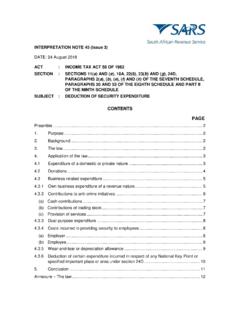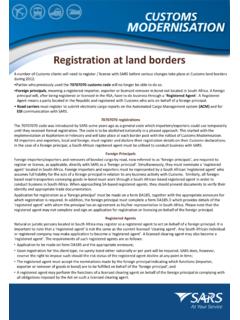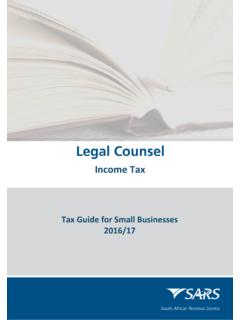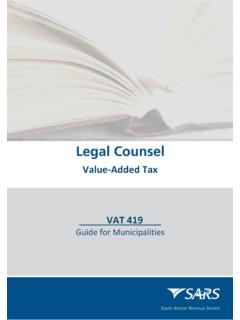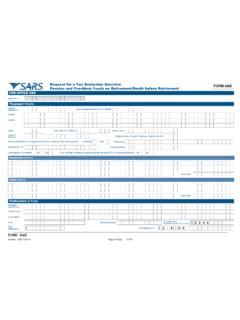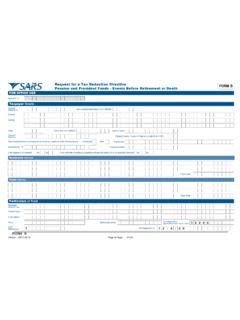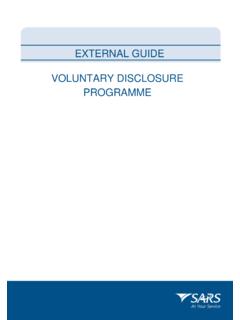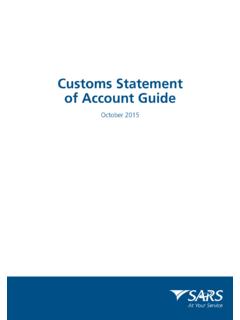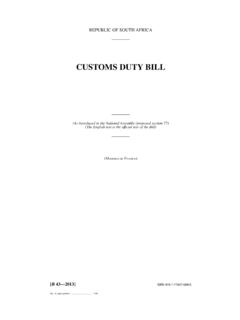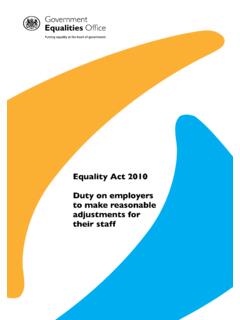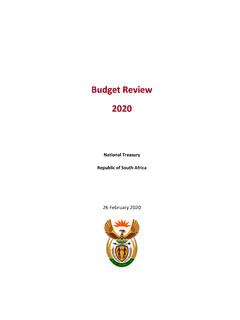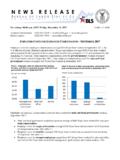Transcription of PAYE-GEN-01-G03 - Guide for Employers in respect of ...
1 EXTERNAL Guide Guide FOR Employers IN respect OF ALLOWANCES (2022 TAX YEAR) EXT ERNAL Guide Guide FOR Employers IN respect OF ALLOWANCES PAYE-GEN-01-G03 REVISION: 11 Page 2 of 15 REVISION HISTORY TABLE Date Version Description 26-02-2020 9 Taxation Laws Amendment Act and Budget Speech 2020 24-02-2021 10 Taxation Laws Amendment Act (No. 23 of 2020) and 2021 Budget Speech 01-06-2021 11 Clarification and example of section 8(1)(a)(ii) EXT ERNAL Guide Guide FOR Employers IN respect OF ALLOWANCES PAYE-GEN-01-G03 REVISION: 11 Page 3 of 15 TABLE OF CONTENTS 1 PURPOSE 4 2 SCOPE 4 3 ALLOWANCES 4 SUBSISTENCE allowance 4 TRAVEL allowance 5 allowance TO A HOLDER OF A PUBLIC OFFICE 8 4 REFERENCES 10 LEGISLATION 10 CROSS REFERENCES 10 5 DEFINITIONS AND ACRONYM S 10 EXT ERNAL Guide Guide FOR Employers IN respect OF ALLOWANCES PAYE-GEN-01-G03 REVISION.
2 11 Page 4 of 15 1 PURPOSE The purpose of this document is to assist Employers in understanding their obligations relating to allowances paid or payable to their employees. 2 SCOPE This basic Guide explains the methods to be applied by the Employers in respect of allowances paid or payable to employees and includes the legislation requirements as well as examples. 3 ALLOWANCES SUBSISTENCE allowance Reference to the Act Meaning Am ounts deemed to be expended Exam ple Section 8(1) (a) read together with section 8(1) (c) of the Income Tax Act No. 58 of 1962 (the Income Tax Act). A subsistence allowance is any allowance given to an employee or a holder of any office for expenses incurred or to be incurred in respect of personal subsistence and incidental costs (for example, drinks, lunch, parking).
3 Section 8(1)(c) of the Income Tax Act prescribes that the employee shall be deemed to have actually expended a certain amount (daily expenses in respect of meals and/or incidentals costs) where the employee is absent from his/her usual place of residence. Where the accommodation to which the allowance or advance relates is in the Republic, an amount equal to the following is deemed to be expended for each day or part of a day in the period during which the employee is absent from his/her usual place of residence Only incidental costs R139 Meals and Incidental costs R452. Section 8(1)(a)(ii) of the Income Tax Act states that where the recipient is by reason of the duties of his or her office or employment obliged to spend a part of a day away from his or her usual place of work or employment and provides proof of such expenditure to the employer, a reimbursement or advance for such expenditure actually incurred by the recipient is excluded from taxable income if the recipient is allowed by his or her principal to incur expenditure on meals and other incidental costs for that part of a day and the amount of the expenditure does not exceed an amount of R139.
4 If an employer allows an employee to incur expenditure on meals when obliged to spend a part of a day away from his/her usual place of work/employment by reason of the employee s employment, and reimburses the employee upon the submission of proof of expenditure, such reimbursement up to an amount announced by notice in the Gazette (R139 per day for the 2022 YoA), is not taxable and must therefore not be declared on the IRP5/IT3(a). However, where the reimbursement exceeds the lower of the amount announced or the amount for which proof of expenditure was submitted by the employee, the excess is fully taxable and therefore liable to PAYE, and must be declared under income code 3713 on the IRP5/IT3(a).
5 EXT ERNAL Guide Guide FOR Employers IN respect OF ALLOWANCES PAYE-GEN-01-G03 REVISION: 11 Page 5 of 15 Em ployer borne expenses Please note Em ployees' tax IRP5/IT3(a) details Where the accommodation to which the allowance or advance relates is outside the Republic, an amount equal to prescribed amount applicable to the relevant country is deemed to be expended for each day or part of a day in the period during which the employee is absent from his/her usual place of residence in accordance with the table for the country in which that accommodation is located, please refer to Subsistence allowance - Foreign travel - external annexure. The rates are for guidance purposes only.
6 The rates for each tax year will be published by notice in the Government Gazette. The amounts laid down in respect of travelling abroad will only apply to employees who are ordinarily resident in the Republic in respect of continuous periods spent outside the Republic. The amounts that shall be deemed to be expended do not apply to the extent that the employer has borne the expenses (otherwise than by way of payment or granting of an allowance or advance) in respect of which the allowance was paid for each day or part of a day. A subsistence allowance is intended for abnormal circumstances and therefore an allowance of this nature cannot form part of the remuneration package of an employee.
7 It is an amount paid by an employer to the employee IN ADDITION to the employee s normal remuneration. For more information in this regard, please refer to Interpretation Note No. 14 on the SARS website, under Interpretation Notes/Income Tax. If a subsistence allowance or advance is paid to an employee on or after 1 February 2006, the allowance or advance is deemed to become payable to the employee in the following month in respect of services rendered where such an allowance or advance was paid to the employee during any month in respect of a night away from his/her usual place of residence and that employee has not by the last day of the following month either spent the night away or refunded that amount to the employer.
8 Employees' tax must not be deducted from the subsistence allowance , regardless of whether or not the deemed amounts and/or prescribed periods are exceeded. The subsistence allowance must be reflected in full on the certificate under Code 3704 (for local travel) and/or code 3754 (for foreign travel) in cases where the deemed amounts are exceeded. Code 3714 (for local travel) and/or code 3764 (for foreign travel) in cases where the deemed amounts are not exceeded. TRAVEL allowance Reference to the Act Meaning Section 8 (1) (b) A travel allowance is any allowance paid or advance given to an employee in respect of travelling expenses for business purposes. Any allowance or advance in respect of travelling expenses not to have been expended on business travelling to the extent that it has been spent on private travelling (this includes travelling between the employee s place of residence and his/her place of employment or any other travelling done for his or her private or domestic purposes), shall be deemed not to have been actually expended on travelling for business.
9 EXT ERNAL Guide Guide FOR Employers IN respect OF ALLOWANCES PAYE-GEN-01-G03 REVISION: 11 Page 6 of 15 Travel allow ance Vehicle let to the em ployer Reim bursive travel allow ance Prescribed rate per kilom etre The following two situations are envisaged, namely A travel allowance given to an employee to finance transport (for example, a set rate or amount per pay period). A reimbursement given to an employee based on actual business travel. The definition of variable remuneration was extended to include any amount paid or granted in reimbursement of any expenditure. Therefore, any allowance or advance paid as variable remuneration in terms of section 7B must be included in the tax year that the allowance or advance is paid to the employee and NOT when it was incurred.
10 The employees' tax deducted in respect of the travel allowance must be reflected as Pay-As-You-Earn (PAYE). The total travel allowance (100%) must be reflected on the IRP5 certificate under code 3701. 80% of the travel allowance paid to an employee is subject to the deduction of employees' tax. Where the employer is satisfied that at least 80% of the use of the motor vehicle for a year of assessment will be for business purposes, then only 20% of the allowance is subject to the deduction of employees tax effective from 1 March 2011. Note that this determination must be done on a monthly basis. If an employer withheld employees tax on only 20% of an employee s travel allowance and circumstances change such that the employer realizes that the employee will no longer use the vehicle at least 80% for business purposes during the year of assessment, from the month in which the circumstances change, employees tax must be withheld on the 80% of employee s travel allowance .
